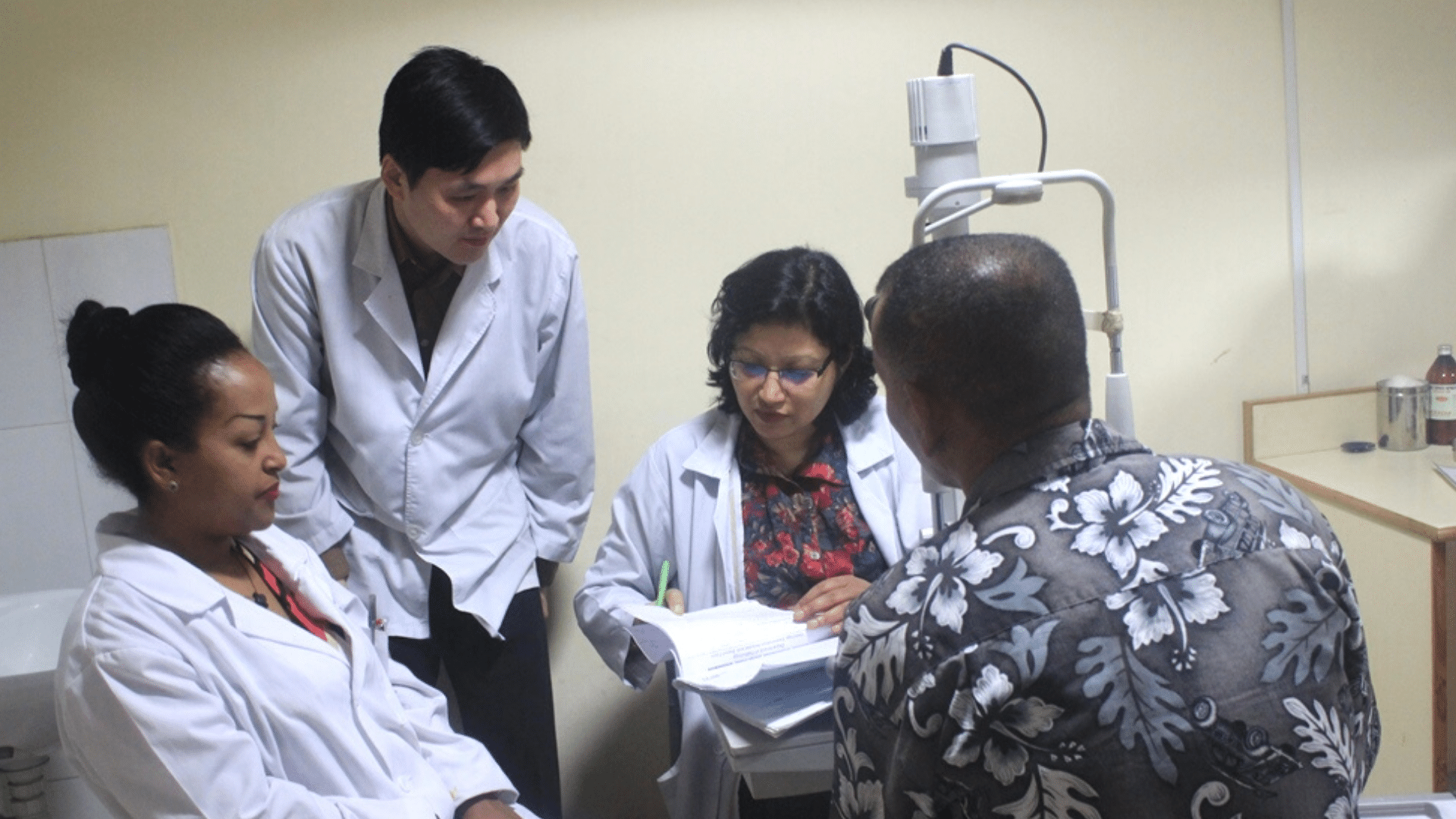Course Details
Short Term Training in Cornea and External Eye Disease (3 Months)
Course Objective
General objective
- To improve the diagnostic skill, decision making process and surgical skill of participants in the areas of cornea.
Specific objective
- Upon completion of the three months training the trainee should be able to
- Describe the fundamentals of anterior segment anatomy, chemistry, physiology and wound healing including tear formation and function, corneal topography, endothelial cell function and maintenance of corneal clarity
- Know the principles of anterior segment pharmacology including antimicrobial, anti-inflammatory, ocular hypotensive and immunosuppressive agents, with emphasis on bioavailability, mechanism of actions, relative efficacy, safety, and potential complications.
- Develop skill in diagnostic techniques including slit lamp bi-microscopy, corneal topography, vital stains of the ocular surface, corneal biopsy techniques and interpretation, and corneal pachymetry, keratometry, keratoscope, specular microscopy,
- Provide knowledge on pathogenesis of disorders of eye lid margins, conjunctiva, cornea and sclera.
- Knowledge about equipments and instruments for various corneal surgical procedures.
- Recognize and treat the congenital, developmental and metabolic disorders of the cornea, anterior segment anomalies, including various anomalies associated with specific genetic abnormalities, corneal dystrophies, and corneal degenerations.
- Diagnose and treat Non-infectious keratitis including marginal keratitis associated with connective tissue disorders or hypersensitiy reaction to infectious etiology, neurotrophic ulcer, exposure keratopathy , central ulcerative keratitis, epitheliopathies, , and interstitial keratitis.
- Management of Immunological disorders like Steven Jonshon’s syndrome, ocular cicatrical pemphigoid,
- Management of tear film dysfunction associated with SJS syndrome, connective tissue disorders, herpetic eye diseases, sjogren’s syndrome or idiopathic. Knowledge about puntal plug application and puntal cautery .
- Familiarize with basics of microbiology related to corneal infection. Knowing about technique of collection of specimen form corneal , scleral or conjunctival specimen collection inoculation into different media. Ability to perform Gram, Giemsa and KOH staining and interpretation .
- Diagnose and manage the corneal infection (bacterial, viral, fungal, protozoal, chlamydial ) Medical and surgical management of corneal thinning and perforation, including techniques of pharmacological manipulation, application of tissue glue., intracorneal and intracameral injectionof antimicrobials
- Recognition and treatment of chemical burns eg acid , alkali and other chemicals
- Nutrition related corneal and conjunctival disorders – recognition and treatment
- Effective management of ectatic disorders like keratoconus, keratoglobus , pellucid marginal degeneration
- Demonstrate skill in penetrating and lamellar keratoplasty, with emphasis on patient selection, councelling, surgical technique, and postoperative care.
- Use of therapeutic bandage contact lens.
- Concept of eye banking and hospital corneal retrieval. Knowledge of donor selection and contraindicatios, and eye banking procedures evaluation of tissue , grading of tissue, Various types of storage media
- Integrate the corneal and external eye disease component into Ophthalmology and general medicine . eg recognition of corneal manifestation of systemic disease eg Wilson's disease, Tuberculosis, Leprosy, Syphilis, toxicity of systemic drugs
Highlights of the course
- Highly qualified and skilled motivated mentors
- Wet lab (If necessary) Candidate will have training on pig eyes at the wet lab prior to performing real time surgery.
- Access to various standard and recent books and videos in the library.
- Post-operative review of cases by mentor.
- Hands on practice (Clinics, Theatre)
- Participation in Journal club/grand rounds/guest lectures.
Eligibility Criteria
- Candidates should have MD in Ophthalmology degree recognized by the Medical Council.
- Candidates should have minimum one year of work experience in Government, University or other similar recognized hospitals after MD in Ophthalmology
- Application will collect by Academic & Training Department of TIO and Selection process will be interview. Selection Committee will be as follows (Representative from faculties, Representative from Academic & Training Department)
Accommodation
Accommodation will be provided for the selected candidates based on their request. Candidates posted in TIO can stay at TIO'S Trainees Apartment. Candidates selected for other centers, accommodation is available at hotel/hostels.
For TIO: USD 25/day for single room and USD 40/day for double room (for International candidates)
Food
Lunch is served at the Canteen (local Nepalese menu) and trainees should prepare breakfast and dinner themselves. However there are number of good restaurants located within walking distance.
Mode of Payment
The intimation will be sent to the selected candidates by email / post. Candidates can pay the course fee through wire transfer. Once paid, fee is non-refundable for any reasons.
Admission / How to apply
Applicants are requested to download the application forms from our website academic.tilganga.org or you can email on [email protected] and send the completed form by email.
COURSE LOCATION
-
Location: Tilganga Institute of Ophthalmology
-
Number of Seats: 4 Seats / Year (January, April, July & October Intake)
-
Address: Gaushala, Bagmati Bridge, Kathmandu
COURSE INFORMATION
-
Course Duration: 3 Months
-
Fee Structure: NPR. 187,500 (for Nepalese candidates) US $ 3000 (For overseas candidates)
